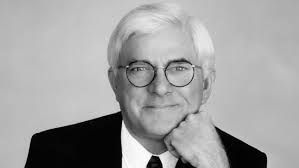
Table of Contents
Phil Donahue
Phil Donahue, a trailblazing figure in the world of television talk shows, has passed away at the age of 88. His death marks the end of an era for a genre of television that he helped shape and redefine over several decades. Donahue’s contributions to media, his innovative approach to talk shows, and his role in addressing social issues have left an indelible mark on American television.
Born Phillip John Donahue on December 21, 1935, in Cleveland, Ohio, Donahue grew up in a working-class family, the eldest of five children. His early life was marked by modesty and a strong work ethic, traits that would later define his professional career. After earning a degree in business administration from the University of Notre Dame, Donahue began his career in television as a production assistant in Dayton, Ohio.
The show was initially broadcast on local television, but it quickly gained a following for its innovative format. Unlike other talk shows of the time, Donahue’s show was known for its willingness to tackle controversial and often taboo subjects. He was one of the first hosts to bring in audience participation as a central element of the show, allowing viewers to ask questions and share their opinions directly. This approach not only set his show apart but also helped pave the way for future talk shows and interactive television formats.
In 1970, “The Phil Donahue Show” made the leap to national syndication, marking a significant moment in television history. The show became a staple of daytime television and was renowned for its frank discussions on issues ranging from politics and social justice to personal relationships and mental health. Donahue’s fearless approach to these topics often made headlines and stirred public debate, cementing his reputation as a trailblazer in the industry.
Donahue’s show was also notable for its ability to attract high-profile guests from various fields, including politicians, celebrities, and activists. He was known for his incisive interviewing style, which combined a deep respect for his guests with a relentless pursuit of truth. This made his show not just a platform for entertainment but a space for genuine discourse and exchange of ideas.
One of the hallmarks of Donahue’s career was his commitment to addressing social issues that were often overlooked or ignored by mainstream media. His show covered a wide range of topics, including civil rights, gender equality, and environmental concerns. Donahue’s willingness to confront these issues head-on earned him both admiration and criticism, but it also contributed to a broader public awareness and discussion of important societal challenges.
Despite his success, Donahue’s career was not without its challenges. In the 1990s, the landscape of daytime television began to change, with a growing emphasis on sensationalism and entertainment rather than substantive discussion. This shift in focus led to a decline in the popularity of Donahue’s show, and in 1996, he decided to retire from daily television. However, his influence on the talk show format and his role in shaping public discourse remained undeniable.
Following his retirement from daytime television, Donahue continued to be active in media and public life. He made guest appearances on various talk shows and news programs, where he shared his insights on current events and continued to advocate for the causes he cared about. His legacy as a pioneering talk show host was further cemented by his induction into the Television Hall of Fame in 1993.
Donahue’s personal life was marked by his marriage to Marlo Thomas, an actress and activist known for her work on “That Girl” and her philanthropic efforts. The couple married in 1980, and their partnership was one of mutual respect and shared commitment to social causes. Thomas and Donahue were known for their joint efforts in promoting charitable causes and advocating for social change.
As news of Phil Donahue’s passing spreads, there has been an outpouring of tributes from colleagues, fans, and public figures who remember him as a pioneer of television journalism and a champion of meaningful conversation. His work not only entertained but also educated and provoked thought, making a lasting impact on the media landscape.
In reflecting on Donahue’s career and his contributions to television, it is clear that his legacy extends far beyond the confines of his show. He was a figure who challenged conventional norms and pushed the boundaries of what a talk show could be. His emphasis on audience engagement, his willingness to tackle difficult subjects, and his commitment to fostering open dialogue have left a lasting impression on the industry.
Phil Donahue’s death marks the end of a remarkable chapter in television history. His innovative approach to talk shows and his dedication to addressing important social issues have ensured that his influence will be felt for years to come. As we remember Donahue, we honor not only his achievements but also his role in shaping a more open and inclusive media landscape. His legacy is a testament to the power of television to inspire, inform, and effect change, and his contributions will continue to be remembered and celebrated by those who value meaningful and impactful media.









